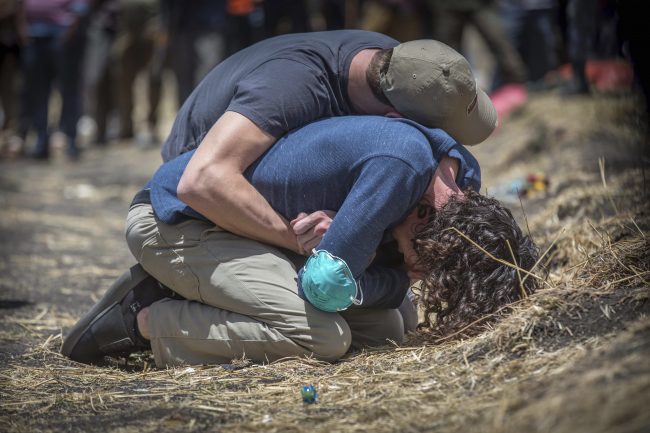Paul Njoroge wanted the burial site of his wife, mother-in-law and three children to be a memorial for both himself and the world to remember them by.

Instead, he was abruptly notified two days before his family was to be interred in a country more than 11,000 kilometres away, and was not able to attend.
“That means that they really did not care about the feelings of all the families of the victims and that is inexcusable,” Njoroge said.
“That leaves us so, so much appalled, and you know, it’s something that is beyond what you would expect a human being to do to the other person.”
Njoroge wasn’t alone in this predicament.
Family members of only two of the 157 victims were present for their loved ones’ burial this Thursday at the crash site of Ethiopian Airlines flight 302, according to a statement from a firm representing the victim’s families.
An email from Ethiopian Airlines, which has been obtained by Global News, was sent to Njoroge and the other family members of crash victims on Tuesday, notifying them that the burial would take place two days from the time it was sent.

“So we were given a one-day notice,” said Njoroge. “To me, that is one day because of the time difference.”
Taking into account the the time difference and a 13-hour flight, it would take 21 hours to fly to Addis Ababa, the capital of Ethiopia, from Njoroge’s home in Toronto.
With a vast majority unable to attend, relatives have since said they were upset and even felt “robbed” of the closure they needed by being unable to take part in the ceremony.

Get breaking National news
Ethiopian Airlines did not respond to a request for comment from Global News as to why family members were not told further in advance. Boeing, too, did not respond for a request for comment.

Relatives of those who died in the crash have been asking to receive remains over the last eight months, but the force of the impact was so severe that no complete bodies were recovered.
“They might have got a body part back, they might have got confirmation, but it took months to do so,” said Bob Clifford, lead counsel for the family member’s case against Boeing.

“We’re talking now eight months, post-crash, and that prolongs the agony, and the angst, and the grief and the suffering in unimaginable and unspeakable ways, and you know, it just seems that Ethiopian Airlines has been oblivious to this.”
In October, some families travelled to Addis Ababa to pick up some remains following DNA tests. At the time, recent flooding in Ethiopia had also both uncovered and deteriorated the remains of victims which were strewn across the exposed crash site, something Njoroge said horrified the families.

“We kept on asking them to make sure that they have recovered all the remains, all the possible effects of our loved ones,” said Njoroge.
“That did not happen. They did not do a very good job, because once the rains started pouring, there were instances where human remains would be uncovered because the erosion, because of the soil being moved away.”
Bound for Nairobi, Ethiopian Airlines flight 302 plummeted into a rural countryside area just minutes after taking off on March 10, 2019.
A malfunction aboard the Boeing 737 MAX 8 aircraft had forced the plane’s nose to pitch downward as pilots tried to regain altitude.

The nosedive of a Lion Air 737 MAX in Indonesia a year ago resulted in the deaths of all 189 people on board. An investigation initially uncovered that the malfunction of plane’s MCAS anti-stall system was the reason for the plane’s downward descent.
It’s also speculated that a similar malfunction befell the Ethiopian Airlines flight prior to the crash.
The 737 MAX model has since been grounded by aviation authorities worldwide as Boeing works on a fix.
According to Njoroge, representatives of both Ethiopian Airlines and Boeing were present at the burial. Some embassy employees from the victims’ respective countries were there as well.
A family member of one of the victims, Adrian Toole, says he’s considering legal action against Ethiopian Airlines in order to “secure a leading role in planning for a future memorial.”

Boeing agreed to a payout of US$100M in July, with half of it going to families and half going to fund projects in local communities. Family members have since created foundations they say will be used to create a memorial.
“We have every day of our lives, we have seen in our sleep, we have had nightmares where we have seen that crater … we have seen the crash site every day, and we’ve lived knowing that the flesh of our loved ones were left there,” said Njoroge.
— with files from Reuters










Comments